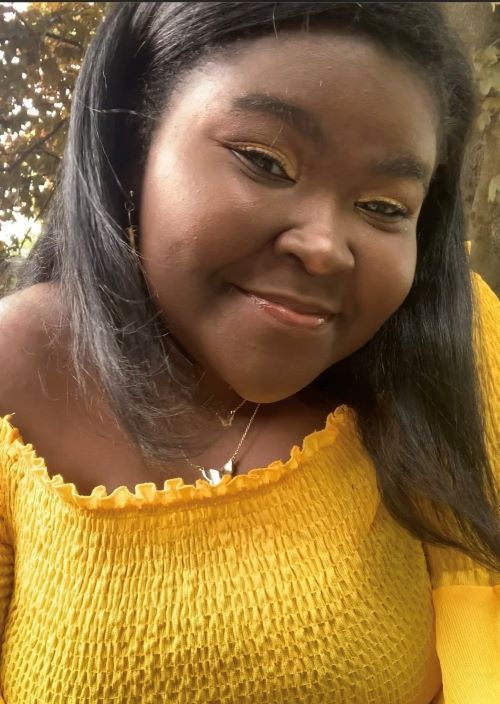PSY Research Spotlight with Asha Denny
April 2, 2025 - Shelly DeJong
 Meet Asha Denny, a senior studying psychology with a minor in African American and African Studies. For several years now, Asha has worked as a student researcher with Dr. Emilie Smith where they do arts-based research with children. We recently had the opportunity to speak with Asha about why she loves psychology research, what she’ll be presenting at UURAF, and who has helped her along her journey at MSU.
Meet Asha Denny, a senior studying psychology with a minor in African American and African Studies. For several years now, Asha has worked as a student researcher with Dr. Emilie Smith where they do arts-based research with children. We recently had the opportunity to speak with Asha about why she loves psychology research, what she’ll be presenting at UURAF, and who has helped her along her journey at MSU.
What made you interested in psychology?
I knew I wanted to pursue psychology since middle school. I've experienced firsthand how beneficial psychology can be. I’ve also always wanted to work with children, so initially I thought I would focus on therapy. It wasn’t until I started talking to people in research and academia that I discovered a whole other avenue within psychology. Since I love school and enjoy academic work, I realized that research was exactly the path I wanted to take.
Tell us about your research that you do with Dr. Smith.
The research we are conducting in the lab consists of a combination of a literature review, methodology, and the theoretical framework of Arts-Based Research (ABR), as well as going into schools in Lansing communities to talk with parents and children about their racialized experiences within the school system. ABR is a newer approach in research that recognizes children as producers of culture rather than just consumers. This suggests that children actively create cultural meanings rather than just absorbing what they see and hear.
One thing a lot of children do from a very early age is draw, paint, build with Legos and use Play-Doh. These activities can be valuable avenues for children to articulate their experiences and ideas, facilitating a dialogue between researchers and the young participants that respects their perspectives and interests. This approach creates a more equitable relationship between researchers and children, reducing the potential for exploitation. At the same time, it provides children with therapeutic resources and activities, allowing them to take an active role in their own research processes.
My project that I'll be presenting at UURAF dives deeper into the methodology and theoretical framework of ABR to explore how it can be used in various populations.
Has anything surprised you about research?
I always thought research was going to the lab and doing chemistry and biology, which I wasn’t interested in. When I started working with Dr. Smith, though, I realized that research can also be qualitative – which is way more interesting to me. It was exciting to see that psychology could align with my interests and doesn’t have to conform to a narrow, Eurocentric view that overlooks diverse needs and interests.
I came to realize that research in academia can really be whatever you make of it. While those interested in neuroscience and statistics may thrive in that area, many others are drawn to the humanities and the intersections of diversity, equity, inclusion, history, and social work. Understanding the psychology behind people’s actions is also crucial. Research can be an excellent way to delve into these topics, especially since we're surrounded by so many great faculty members.
Do you have advice for anyone thinking about getting into research?
People often limit themselves to the teachers they have already met. I recommend checking the psychology department's website to explore different faculty bios and publications. If someone seems interesting, reach out to them. Sometimes I would just knock on their office door—sometimes they answered, and sometimes they didn’t—but I always learned something valuable from those interactions.
Would you like to give a shoutout to anyone at MSU?
I’d love to give a shoutout to both Dr. Smith and Simone Bibbs, a graduate student in her fifth year pursuing her PhD in the Department of Human Development and Family Studies. It has been incredibly helpful to have their support from teaching me how to use Google Scholar to encouraging me to showing me the ropes of grad school applications.
It’s so inspiring to have them as role models as well. Simone is doing exactly what I aspire to do next—and Dr. Smith really exemplifies the career I aspire to have. It is validating to see someone who looks like me doing the work I want to pursue.
I also want to give a shout-out to the AAAS department, which is one of my favorite departments on campus. At the end of the day, they are the teachers I turn to when I have a tough day and need someone to talk to. They have shown me that studying the history of self and Black girlhood is a valid academic research opportunity. I have taken around eight or nine classes in AAAS and it's fascinating to explore the theoretical frameworks of intersectional feminism, Black feminisms, and hip-hop feminisms. This has reignited my love for reading and really led me to fall in love with learning again.

